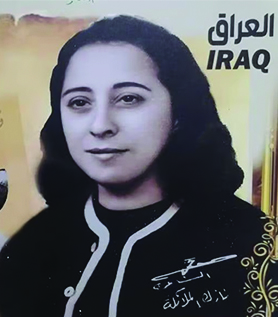Nazik al-Mala’ika was born in 1923 in Baghdad, Iraq, to parents who were poets. She began to write poetry as a child and finished her first classical poem at age ten. After she finished high school in 1939, al-Mala’ika studied classical Arabic poetry and 20th-century modernist writers at the Iraqi Teachers’ Training College in Baghdad, graduating in 1944. Then, after studying for a year at Princeton University in New Jersey, she moved to Wisconsin, where she earned a master’s degree in comparative literature at the University of Wisconsin–Madison. After that, she returned to Baghdad and married. She and her husband helped to start the University of Basra.
A very accomplished writer, al-Mala’ika has been called one of the most important modern Iraqi poets. Her first collection of poems, titled Night Lover in its English translation, was published in 1947. Although she wrote these poems in the classical rhyme form, her tone was quieter and more reflective than the passionate tone of most other Arabic poetry of the time. In the same year, she wrote “Cholera,” her first poem in free verse, about the epidemic that killed thousands of people in Egypt. At first other poets and even her own family criticized her for writing in a different style. Al-Mala’ika felt insulted by their rejection and hid from public literary life, but she did not stop writing. In 1949 she published Shrapnel and Ashes and followed that with more books of poetry as well as articles about Arabic literature and the free-verse movement.
Al-Mala’ika challenged expectations by speaking up for women’s rights. She gave passionate speeches calling for women to question the patriarchal system (a system in which men hold most of the power in society) in Iraq and have more of a voice. She also used her poetry to do this — for example, by criticizing the practice of family honor killings (in which a female relative is killed for disgracing the family name) in one of her pieces. Al-Mala’ika was financially independent, which was unusual for women at that time, and she opened doors for Iraqi women who came after her. She even formed an association for women who didn’t want to get married, although it was eventually disbanded.
In 1970, al-Mala’ika left Iraq and moved to Kuwait, where she worked as a professor for many years. In 1990, when Saddam Hussein invaded Kuwait, she had to go back to Iraq until the Gulf War ended; then she moved to Cairo, Egypt, where she lived for the rest of her life. She suffered from Parkinson’s disease for many years before she died in 2007 at the age of 83.
LEARN MORE
Creswell, Robin. “Nazik al-Mala’ika and the Poetics of Pan-Arabism.” Critical Inquiry, vol. 46, no. 1 (2019), pp. 71–96; https://doi.org/10.1086/705300.
Drumsta, Emily. Revolt against the Sun: The Selected Poetry of Nazik al-Mala’ika: A Bilingual Reader. Saqi Books, 2020.
de Groot, Helena. “A Sea of Rhythm” (audio interview with Dr. Emily Drumsta). Poetry off the Shelf, Poetry Foundation, May 4, 2021; www.poetryfoundation.org/podcasts/155885/a-sea-of-rhythm.
Khakpour, Porochista. “The Woman Who Came in from the Night.” Poetry Foundation, April 26, 2021; www.poetryfoundation.org/articles/155855/the-woman-who-came-in-from-the-night.
Mohammed, Amthal. “Nazik Al-Malaika: Perusals and Translations.” University of Diyala, April 2020; https://www.researchgate.net/publication/340634111_Nazik_Al-Malaika_Perusals_and_Translations.
“On Nazik Al-Mala’ika’s Revolutionary Romantic Poetry” (interview with Emily Drumsta). ArabLit & ArabLit Quarterly, September 5, 2013; https://arablit.org/2013/09/05/on-nazik-al-malaikas-revolutionary-romantic-poetry.
Rubin, Alissa J. “Nazik Al-Malaika, 83, Poet Widely Known in Arab World, Is Dead.” The New York Times, June 27, 2007; https://www.nytimes.com/2007/06/27/arts/27malaika.html
Stevens, Simone. “Nazik Al-Malaika (1923-2007): Iraqi Woman’s Journey Changes Map of Arabic Poetry.” Al Jadid, 2007; https://www.aljadid.com/content/nazik-al-malaika-1923-2007-iraqi-woman’s-journey-changes-map-arabic-poetry.
Image: from photo of 2023 Iraqi postage stamp commemorating the poet on the 100th anniversary of her birth; see https://en.964media.com/2777.
Profile drafted by Emma McClure and edited by Kimberly Huete.
